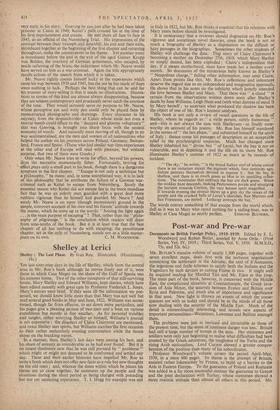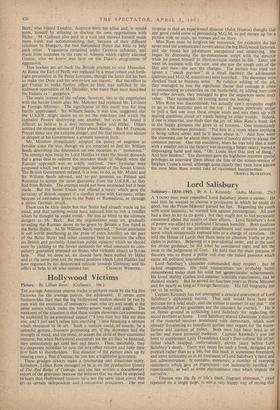Post-war and Pre-war
MR. BUTLER'S massive volume of nearly 1,300 pages, together with seven excellent maps, deals first with the tortuous negotiations concerning the settlement in the Adriatic, the raid of d'Annunzio, the ingenious and futile schemes to satisfy both the Italians and the Yugoslays by such devices as cutting Fiume in two. It might well be required reading for Marshal Tito and Mr. Eden at this time. The main part of the book, however, is concerned with the Middle East, the complicated situation at Constantinople, the Greek inva- sion of Asia Minor, the quarrels between France and Britain over Syria and Palestine, and much else of importance and significance in that area. New light is thrown on events of which the conse- quences are with us today and should be in the minds of all those now dealing with the security of the Middle East. Much of the detail is extraordinarily interesting, and reveals new aspects of important personalities—Weizmann, Lawrence and Balfour amongst them. The problems were just as intricate and intractable as those of the present time, but the sense of imminent danger was less. Britain had still alarge number of troops in the area. Her statesmen and soldiers were only just beginning to realise what difficulties had been created by the Greek adventure, the toughness of the Turks and the rising Arab nationalism. Lord Curzon showed a greater compre- hension of the position than many of his subordinates.
Professor Woodward's volume covers the period April-May, 1939, in a mere 800 pages. Its theme is the attempt of Britain, assisted rather lukewarmly by France, to build up a barrier to the Axis in Eastern. Europe. To the guarantee of Poland and Rumania was added in a far more successful manner the guarantee to Greece and the joint declaration with Turkey, whose statesmen showed a more realistic attitude than almost all others in this period. Mr. Beck, who visited London, deceived both his allies and, it would seem, himself by refusing to disclose his own negotiations with Hitler. M. Gafencu also paid us a visit and showed himself much more frank and accommodating, ,but, because of their different relations to Hungary, the two threatened States did little to help each other. Yugoslavia remained under German influence, and made little response to the rape of Albania which rightly alarmed Greece, who we know was next on the Duce's programme of aggression.
This lawless act set back the British attempt to woo- Mussolini. At Rome the Earl of Perth was replaced by a more robust and forth- right personality in Sir Percy Lorraine, though the latter did his best to make the Duce and his son-in-law see reason. But the effort to get France to make further offers to Italy was nullified by the stubborn opposition of M. Daladier, who more than once described the Italians as " gangsters."
The main interest of the volume, however, lies in the negotiation with the Soviet Union after Mr. Molotov had replaced Mr. Litvinov as Foreign 'Minister. The significance of this event was for long hardly appreciated. Sir William Seeds, it was true, suggested that the U.S.S.R. might desire to sit on the side-lines and watch the capitaligt Powers destroying one another, but even he found it difficult to believe in a deal between Stalin and Hitler. Others noticed the strange silence of Hitler about Russia. But M. Francois Poncet alone saw the extreme danger, and for that reason was almost in despair at his Government's attitude towards Italy.
Mr. Molotov immediately adopted the policy of negation so familiar since the war, though we are surprised to find Sir William Seeds describing the discussion on one occasion as " huthorous." The attempt ryw made by Lord Halifax to meet the Soviet demands did a great deal to redeem the mistakes made in March when the Russian approach was so coldly received. New formulae were proposed which met every legitimate demand of the Soviet Union. The British Government refused, it is true, to do, as Mr. Maiski and Sir William Seeds advised, and to put pressure on Poland and Rumania to accept the same guarantee from the U.S.S.R. as they had from Britain. The attempt could not have succeeded had it been made. But the Soviet Union was offered a treaty which gave the certainty of British support if a conflict arose with, Germany, either because of assistance given to the Poles or Rumanians, or through a direct German attack.
There can be little doubt but that Stalin had already made up his mind, and that nothing would have induced, him to risk a conflict which he thought he could avoid. He was as blind to the ultimate dangers as Mr. Beck. But the negotiations went on, gradually revealing the Russian desire to be given by Britain a free hand in the Baltic States. As Sir William Seeds reported, " Soviet assistance is not worth purchasing 4 the price of extra hostility on the part of the Baltic States and other countries (not to mention the effect on British and probably American public opinion) which we should earn by yielding to the Soviet demands for what amounts to corn- pulsory guarantee imposed on States who violently object to Soviet help." Had we done so, we should have been outbid by Hitler and at the same time lost the moral position which Lord Halifax had now regained by his determined attitude towards Germany and his
offers of help to all who resisted her. CHARLES WEBSTER.



































 Previous page
Previous page